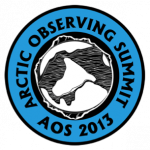
Contributed by Maribeth Murray, International Study of Arctic Change (ISAC) Executive Director.
The first Arctic Observing Summit (AOS2013), held 30 April–2 May 2013 in Vancouver, BC, Canada, brought together a cross-section of the arctic community to deliberate on the design, implementation, coordination, and sustained long-term (decades) operation of an international network of arctic observing systems. The AOS is a task of the Sustaining Arctic Observing Networks (SAON) process, which is led jointly by the Arctic Council and the International Arctic Science Committee (IASC). The International Study of Arctic Change (ISAC) is responsible for leading the AOS task.
The AOS2013 addressed four themes:
- The status of the current observing system.
- Observing system design and coordination.
- Stakeholder perspectives on observing system design and integration.
- Mechanisms for coordination of support, implementation, and operation of a sustained arctic observing system.
The format of the AOS was based on community-driven white papers, which were made available for online public comment. A total of 60 white papers and statements were posted. Synthesis papers were prepared for the issues of data management, stakeholder perspectives, and status of the current observing system. The white papers and synthesis documents are available online through the AOS website. Videos of several of the talks and panel discussions are also available online.
More than 170 participants from 12 nations represented funding agencies, northern residents, policy makers, industry, science planners, and a variety of scientific disciplines. Strong representation from China, Japan, and South Korea highlighted the importance of arctic observing programs for operational weather forecasts in eastern Asia as well as growing economic interests in the Arctic, particularly with respect to resource development and shipping activities. A panel on international collaboration brought together agency representatives from four countries and the European Union. This panel stimulated a vigorous question and answer session from AOS participants, particularly with respect to opportunities and limitations of funding strategies for international observing activities. Panel contributions by representatives from North American arctic indigenous organizations on stakeholder engagement with observing system design emphasized both the need and the benefits to be derived from an early engagement of these groups in the design and execution of an observing network that does more than pay "lip service" to information needs by arctic residents.
The ISAC International Program Office will release policy briefs and shorter articles derived from the AOS2013 over the coming months. The full report from the Arctic Observing Summit 2013 is expected in autumn 2013. Subsequent summits will be held in conjunction with the Arctic Science Summit Week (ASSW), starting with the ASSW in April 2014 in Helsinki, Finland, and thereafter biennially.
For more information, see the AOS website at http://www.arcticobservingsummit.org/ or contact Maribeth Murray at murray [at] arcticchange.org.
